Your Guide to Canine Oral Health

As a loving pet owner, you take care of a wide spectrum of your pup's needs, including vaccinations, socialization, grooming, feeding, and exercise. One aspect you may have overlooked is the importance of canine oral health. According to the American Veterinary Medical Association , your dog will likely have signs of dental disease by age 3. Do not despair! Follow this guide to reverse the trend and ensure a lifetime of dental wellness for your dog. Know the Importance of Canine Dental Care Dogs are susceptible to a variety of oral health problems. Though not prone to develop cavities, common oral issues include: plaque, scaling, infections, abscesses, and gum disease (periodontal disease). Not only do these issues affect your pooch's teeth, but they have whole body implications. Untreated periodontal disease can cause heart disease and can also affect your pet's kidneys and liver. Bacterial build-up produces toxins which your dog swallows, causing gastric issues. Perform Routine Dental Care at Home Fortunately, a thorough daily oral hygiene routine can prevent and even reverse dental health problems. The best time for you to begin these healthy habits is the day you bring your dog home. What is the second-best time to start? Today! At any age, your dog can begin and benefit from daily tooth care. Dental Health Products There are a variety of digestible chews and specially designed toys that benefit oral health. Look for products designed to promote adequate chewing, which aids in plaque removal. Oral-Care Additives are placed daily in your pet's water dish and can help freshen breath and prevent bacterial growth. Often odorless and tasteless, they are an easy way to boost oral health. Tooth brushing No dental products are an adequate substitute for good old-fashioned tooth brushing. Just as you would not go a day without brushing, you should make it a part of your dog's daily routine. Establish this routine with a few basic guidelines:
- Do not use toothpaste designed for humans. Besides having unappealing flavors for dogs, it often contains ingredients which are harmful or even fatal to pets, like the sweetener xylitol. Specialty canine toothpastes have doggy-desired flavors like liver and peanut butter, but water alone is adequate for canine brushing.
- Use a toothbrush designed for dogs. Choose one adequately sized for your breed's mouth. Prepare to familiarize your dog with the brush before use.
- Ease into brushing following positive training steps. Do not be surprised if your efforts are met with initial resistance. Have plenty of high value treats on hand to guide and reward your pet's behavior.
- Start by lifting gums and touching your dog's teeth. Work up to the ability to rub teeth and gums with your fingers.
- Once your pet is comfortable with your fingers touching gums and teeth, introduce the toothbrush and clean all surfaces of each tooth.
- Bad breath
- Bleeding gums
- Hardened plaque
- Tooth pain when chewing
- Excessive drooling
- Mouth sensitivity





